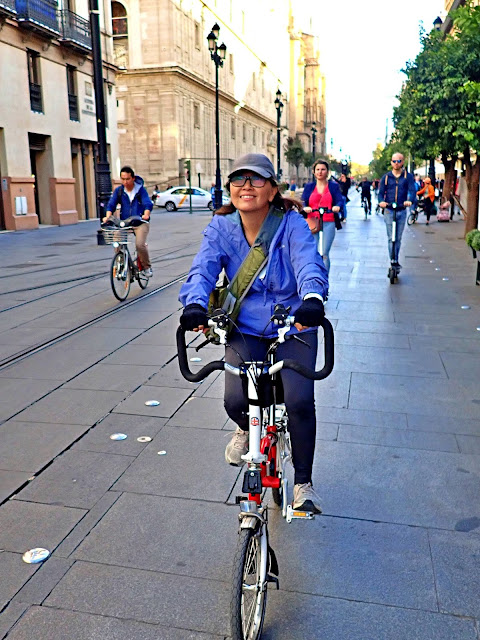 |
| The open court yard of The Story Guest House and goodbye for a quick stay. |
 |
| We bought some light snacks for as breakfast on the our bus to Seville at Snack Bar Da Baixa at Praça Ferreira de Almeida, GPS : 37.017061, -7.933743 |
 |
| A short distance to the bus terminal. Photo credit : Anne Cheong. |
 |
| We met an Argentine couple travelling with their touring bicycles and were on the same bus with us to Seville. |
 |
| Let's try the Spanish biscuits. |
 |
| Alsa Bus ended the journey at Plaza de Armas GPS : 37.391478, -6.003204 with an old Tram on display inside the building. |
 |
| Outside the building of Plaza De Armas and heading towards our accommodation which was less than a kilometere away.. |
 |
| We took a detour to a nearby river path, enjoying the lovely weather and beautiful surrounding. |
 |
| The bridge, Puente de Isabel II as viewed from path along the river. |
 |
| Still along the river with a dedicated bicycle lane . |
 |
| Taking a circular ramp up to the main road and heading towards Donkey Gallery (the name of our accommodation in Seville). |
 |
| At first I thought it was some kind of a monastery building, little did I know later it is a bull fighting ring. It is the Plaza De Toros, one of the few active bullfighting rings left in Spain. |
 |
| My Oregon indicated to go into the premises of the bull fighting ring as the recommended route to our desired destination. |
 |
| The place we were staying at Galera Donkey located at Calle Galera GPS : 37.387558, -5.99867837. Photo credit : Anne Cheong. |
 |
| A glimpse of flamenco performance in the street of Seville. We went back out to the old city to explore further including food hunting. |
 |
| Suddenly we fancied a Mexican restaurant, maybe it was due to the attractive decor from the outside of the building. It's Iguanas Ranas at Calle Santo Tomás, 7, GPS : 37.384356, -5.992998 |
 |
| Savouring a Mexican prawn dish that was stuffed with cheese, bacon, red sauce and accompanied with rice and salad. |
 |
| A typical Mexican enchilada consisting of a flour tortilla dipped in chili sauce and stuffed with meat from Iguanas Ranas. |
 |
| Catedral de Sevilla (The Cathedral of Saint Mary of the See), better known as Seville Cathedral. Christopher Columbus and his son Diego are buried in the cathedral. |
 |
| Monument to the Immaculate Conception in the Plaza del Triunfo |
 |
| The Plaza de Virgen de los Reyes is a historic square, dominated by the cathedral and its unique bell tower. Horse-drawn carriages and picture-snapping tourists are part of the scenery here. |
 |
| All kind of transport modes seen at Seville. |
 |
| A modern tram service is also available for one to get around Seville and enjoy the gorgeous sight of the old city. |
 |
| A pair of huge cube shaped trees with a fountain (Mercury Fountain) in between in front of a bank (Banco de España). |
 |
| A metro station at Plaza Nueva where Plaza Nueva is a public square which Seville city hall is located. The land where the plaza is built was formerly part of the San Fernando convent during 1270-1840. The land was later acquired by the local government and converted into a public square. The plaza was completed in 1856. |
 |
| A group of tourists on Dahon folding bicycles was seen exploring the old city, there were also other bicycle tours too moving around the vicinity. |
 |
| Puncturing through the vibrant streets of Seville. |
 |
| A classic shop with beautiful woodwork inside and gorgeous shop front. It is a pastry and coffee haven prominently located at GPS : 37.392653, -5.994892 at the main road of Campana. |
 |
| While Anne was checking out at a Decathlon outlet we waited at a cafe ordered our beer. |
 |
| The first Spanish dinner at Seville. |
 |
| Anne insisting to have her ice cream before we walk back to our apartment. |








1 comment:
Post a Comment